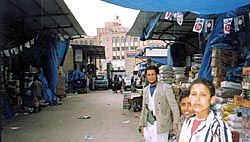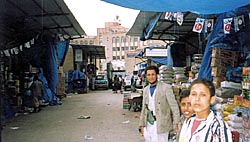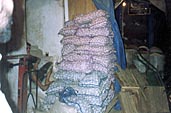
A Special Yemen Times Survey to Reveal the Secrets of Smuggling: The Nightmare of Our National Economy [Archives:1999/34/Reportage]
August 23 1999
Surveyed By:
Jamal Al-Awadhi
Yemen Times
Serious Indications of Smuggling Effects on our Economy
Today, the smuggling of various goods to Yemen seems to be eating away our national pride towards our products. It is crushing our economy and is bringing tens of local factories to the verge of breaking down and announcing bankruptcy. It is a dangerous phenomenon which is holding back any means of future hope for the national productivity of the Yemeni market. In brief, it is the nightmare of national producers. To further know what smuggling is, let us look at what Mr. Mohammed Sharafuddin, the Chairman of the Parliament’s Trade and Industry Committee said “Smuggling is very destructive to our national economy. It is unfair trade for our importers, investors and industrialists. It brings goods unchecked and uncontrolled for quality to our consumers while depriving the state of legitimate revenue. It also creates an underground economy and encourages a law-breaking culture based on bad moral values. In short, smuggling is disastrous for our nation.”

The government had tried to prevent smuggling by opening the way for imported goods from the rest of the world. However, this gave national producing companies another challenge. That is , to meet the quality and price of these imported products. However, despite this courageous step, smuggling continues to grow. The reason behind it is the extremely high taxes that is required to import goods and sell them in the country. If a trader sees that they would gain 50% or more if they smuggle the very same goods instead of getting them through legal means, they would probably choose to do so. However, having them exported legally is causing national producers a headache.
When going to markets, we find all sorts of goods, from Gulf countries, Europe, South East Asia, and many other countries. In price, they may be a bit higher than local products, but in quality, they are simply incomparable. Hence, because people demand better products even for a slightly higher price.
This challenge can be overcome by the local producers because they would hold on to the price advantage. Their products are not that high in quality, but at least they are cheaper. However, the picture becomes ugly when smuggled products are mostly better in quality and cheaper in price than local products. This would eventually kill any kind of competition.
When coming to the point of who is smuggling, Mr. Mohammed Sharafuddin states, “Yet, smuggling cannot be controlled because those who can control it, and do have the power to do so are involved in it.” In a supporting statement, a famous businessman, Mr. Tawfeeq Al-Khamiry states, “There is proof that in some cases, the people involved in smuggling are senior military/security officers or tribal leaders who are closely associated with the system.”So, even though we are sure that there is smuggling taking place, we are yet not able to stop it, simply because those who are behind these acts are people closely associated with the system. It is beginning to turn into an unstoppable nightmare for the government as well.
It is not to say that the government is not trying to stop smugglers. It is indeed working on stopping them. In some incidents where security officials capture smugglers its always reported, but these captured smugglers constitute a very small fraction. The high cost of living, and the economic burden on the average Yemeni is forcing them to choose the smuggled product, even though they may think it is smuggled or illegal.
He has a huge family to feed and his income could barely enable him to buy these cheap smuggled products.
Today, the level of smuggling in Yemen has reached a record high mark. The products smuggled today vary from small candies, to electronic equipment. Even some vegetables like garlic are being smuggled. In a survey devoted for this serious issue, Yemen Times went to traditional markets in the capital city to investigate the dimensions, methods, and harms of smuggling in all its aspect. In its interviews with many traders and people associated with smuggling it discovered that it had become routine in their life, and for many it had become an essential way to make ends meet.
We knew that this issue is a sensitive one, so we tried not to frighten the people who were interviewed. All statements said by these people are from actual true life experiences in the world of smuggling. For the first time, we were able to reveal much of the secrets behind this mysterious underground world of smuggling. It was a world in itself.The deeper we went into the subject, the more we realized that millions and millions of dollars are indeed involved in what we call the “nightmare of every local producer”.
________________
In our mission, we found several marketers who were staring at us in a doubtful way, as if they knew that we aimed at inspecting. Here we started our actual interviews.
Historical background
We started by interviewing seventy year old Mujahid Kamel, a food wholesale marketer in Al-Hasaba Wholesale Marketplace. We asked him to give us a brief background. Our aim was to know how the whole idea of smuggling developed,including the reasons behind its emergence, and how it was handled by the state. Looking to us with emotions as if he was trying to search through his inner Looking at us with emotion as if he was trying to search through his inner memory, he started.
“In the 1980’s smuggling was a lifestyle, and a means of earning immediate revenue. Goods were mainly smuggled via Sa’ada City or Al-Baq’e area from Saudi Arabia. After the goods enter Yemen land then the role of a network of Bedouins who deliver the goods to Raida, and sometimes to Amran kicks in. In these areas existed an open and illegal wholesale marketplace; which was not at the time monitored by the government. Merchants and traders from Sana’a City used to come to this area to buy the smuggled goods for extremely low prices. I can tell you that these dealers were able to make huge profits from these sales, particularly at that time, there was no local production of cooking oil ,and other canned goods.
Hence, smuggling was the main method of getting these products into the Yemeni market. After loading their trucks with these smuggled products and driving to Sanaa , they unfortunately
faced police on their way and were chased. However, most of these dealers used to give these policemen bribes to let them go and continue their trip to Sana’a, nonetheless, at moments they were captured and their goods were possessed by their captors.
However , even though national production began to flourish, the competition between smuggled and national goods was not intense. Smuggled goods were always preferred for their higher profit and demand. Occasionally , the government used to pressure its forces to thoroughly investigate any smuggling operation on the road from Amran to Sana’a, especially at a military point called “Al-Azraqein”. In this case, the dealer is forced to go through a long and unpaved path leading to Sana’a called “Al-Rahba”, while on other
occasions,they go through another unpaved path route passing by Wadi Dhahr. Unlike today, in those days, the Yemeni Riyal was so strong that we did not deal with or even hear of the U.S Dollar.”As he was ending his speech, Mujahid realized that things had changed today so,he started talking about the present situation, “Today, smuggling is much less than before , partially due to the opening of the way for imported goods. Many legal commercial agencies were formed for the production of goods, which used to be smuggled. Despite the large number of agencies which have stopped competing with each other in trying to provide high cost products , the profit out of smuggling has decreased. Yet, even though it’s not at the level of the 1980’s, smuggling continues to exist. Today’s smuggling began to concentrate on products, such as electronic equipment and carpets,which usually come through Hadhramout located in the South and Mareb in the East.”
The Smuggling of Garlic!

Imagine that these resellers had increased the price of some products from YR5,000 to YR10,000 in a single month. How in earth will we be able to buy them? Could you believe that even garlic is being smuggled into the country? As you know, the importing of vegetables and fruits is forbidden by the state, let alone smuggling them into the country. It may be shocking to tell you that Chinese planted garlic is being smuggled through border in the East to Hadhramout, and then taken out of their boxes and put into pales in an attempt to deceive the inspectors and give them the impression that they are local garlic products. As you see behind me, these pales are all Chinese. We all are selling smuggled garlic because they are much better than local ones and their prices are lower. However, I can confidently tell you that the only obstacle towards the abolishment of smuggling is the high duty taxes that is being demanded for imported goods.
The Solution is in the Hands of the Government

the following: “Smuggling is a chronic and deeply rooted problem. The issue is dependent on a certain problem in our community, mainly caused by a downfallen economy. I deeply believe that the solution is in the hands of the government. As an example, many of the smuggled goods come through Al-Mahara and Hadhramout provinces in the East. Spices constitute an important part of these smuggled goods, which are extremely cheap. The smuggler only adds an extra charge for transporting them into the country. These goods attract a lot of dealers who profit a lot by selling them in the spice markets. On the other hand, legally imported spices that come through Hodeidah are undesirable because their prices include transportation, taxes, and other fines that have been paid by the importer to the government. These importers sometimes raise the prices of their goods to extreme levels. As a result, the wholesale or normal seller estimates his profit if he buys the goods legally and realizes that it would be too little, or sometimes , no profit at all would be gained. This is true especially since the average Yemeni citizen does not have the income that enables him to buy what he wants with these prices. Hence, I think that there is a fear that our national economy would continue to deteriorate if the present conditions continue.
However, I also think that the government has the solution in its hands. It could try to minimize the taxes on imported goods as low as possible. It should also supervise the selling rates of the importers and trade agency resellers. It should also facilitate the process of importing goods through its seaports and airports. Look at what is happening at Al-Hodeidah. Many traders have stopped importing goods because of the high taxes on their goods, including spices.”
In an effort to get more information from another marketer, we went to Ali Salah, a trader and manager of a market that sells various food supplies. He said, “I can briefly identify the actual reason behind smuggling in very few words. If the high import taxes and the strict importing proceedings are removed, smuggling would automatically be eliminated. The truth is that every dealer prefers to make more profit in their sales, especially in the current harsh economic conditions where the normal citizen’s purchasing power is weak. For example, if a smuggled packet of goods such as candy and sweets are offered for YR180 and the very same package, that is legally imported, is offered for YR280 to the dealer, which package would they choose? I will let you figure that one out! Even if the dealer wanted to be honest and bought the legally imported package, he would have to sell each candy bar for a higher price. In this case, the customer would not buy the candy, because the store next to it sells the candy bar a lot cheaper, since it was initially smuggled.
As a Trade Agency owner, I try the best I can to avoid smuggled products because of their harm to economy. In conclusion , certain circumstances force us to buy these illegally imported goods. This phenomenon has decreased recently because of the government’s decision to open the door to importing. After this step, the competition between wholesale marketers and trade agencies sharpened acutely. On the other hand, local producers faced the challenge of having their goods compete against higher quality imported goods. Hence , I see that the solution lies in importing taxes to a reasonable level and pressuring local producers to enhance their products. I am also asking the government to enforce strict rules in monitoring markets and trade agencies in an effort to know more of where the smuggled goods are being sold and how they had reached the markets. If these steps are taken, I have no doubt that we would rid the country of smuggling.”
Medicine Smuggling
One of the most dangerous effects of smuggling is medicine smuggling. There have been many reports of out-dated or fake medicine being sold in pharmacies and hospitals. Where did these medicines come from? They were smuggled to the country. To know how this could happen, we talked to Jalal Al-Nuzaily, a trader specializing in the sales of medicine and medical equipment stated the following: “When talking about the smuggling of medicine, unlike other goods, the reason is not because of high tax rates , on the contrary, tax rates for medicine are among the lowest (about 5%.) Ironically,the main reason is behind the medicine trade agencies. These agencies raise the prices of medicine to extreme levels, which are not affordable by most Yemenis. This causes some traders to buy smuggled medicine which arrive to the pharmacies damaged because of the long distance travel while being enclosed in hot containers, which are unsuitable for carrying such sensitive supplies. Usually, this medicine is exposed to sunlight for long periods of time.
In regards to medicine, there is also another kind of smuggling called local smuggling. This means the selling of already exempt medicine is available in hospitals and public clinics to commercial pharmacies for low prices. However, there is encouraging news that the Ministry of Health has implemented tough measures against these traders and closed down a number of violating pharmacies. Consequently, more than 80% of the pharmacies in Yemen have stopped buying this medicine.
There is also a lack of demanding medicine in the country because trade agencies do not import them due to their insignificant profit. Hence, due to the demand of this medicine for humanitarian reasons, some traders try to get this medicine, even through smuggling. I think that the Ministry of Health should do something about this, particularly since smuggled medicine is dangerous for the health of the patients who use them.Legally, imported medicine is vital for some patients to survive. After all, it is a humanitarian need that should always be met. Another problem in medicine smuggling is, that trade agencies sometimes monopolize the selling of certain medicine to a substantial amount of patients. The reason for this is their high price, which is unaffordable to many trade agencies. In these cases, smuggling usually takes place through travelers coming into the country. Sometimes, they buy large quantities of medicine and sell them for a lot of money.
In a general perspective, the selling of smuggled medicine has decreased recently because of the good efforts that the Ministry of Health is making in catching and disciplining smugglers. However, the source of the problems still exists and that is medicine trade agencies and their monopoly over the medicine market in Yemen. This,along with the need to open the door for importing medicine with superior quality can be summed up in these two points.”I think we will rid the country of medicine smuggling for good.”
On the important issue of medicine smuggling, we interviewed Ahmed Ali Al-Hasoosa, the General Manager of Al-Fuad Medicine Distributing and Trade Agency. In regards to the accusations of Jalal, regarding this exploited monopoly, he defended his agency by saying, “It is true that not all, rather , some gluttonous agencies raise their medicine prices hence, indirectly cause pharmacies to buy smuggled medicine. The solution to this, in my view is that agencies should always be satisfied with a profit. Beside this, there should be tougher laws, issued by the Ministry of Health, which raise the price to an unacceptable level. It should also issue stricter laws and implement them against dealers with smuggled medicine. I think these steps will be sufficient to solve the problem of smuggling, which is a devastating issue for the whole nation and its economy. We should fight this smuggling problem with all the power we have. However, we should always study the cause and effect of smuggling in order to be able to find the appropriate and lasting solutions.
Smuggling of Medical Equipment
Regarding medical equipment, we discussed the issue of the smuggling of medical equipment with Abdulwahhab Al-Tamimi, the General Manager of the Tamimi Establishment for Medical Equipment. Mr. Abdulwahhab briefly explained the condition of the smuggling of medical equipment by saying, “In the past, Yemen used to depend on neighboring countries like Saudi Arabia for medical equipment and machines. However, four years ago, the smuggling of such equipment was quite common. Nonetheless, today there is no smuggling of medical equipment because many agencies responsible for providing medical equipment by exporting them directly from the manufacturing country to the Yemeni community. Consequently, smuggled equipment turned out to be even more expensive than the equipment provided by these agencies.
The smugglers no more see this business profitable enough for them so they turned to other products. However, sometimes, the lack of medical equipment becomes disturbing , especially when no suppliers are available. In these particular circumstances, the smugglers take advantage of this and sell their products to pharmacies and stores. The solution to such a problem would be through communication with the producing company supplying the equipment and send it to Yemen as soon as possible. This way we would once again have medical equipment available for all, with reasonable prices and in a legal manner. It seems that there are preying eyes for these circumstances. When certain equipment or machinery is not available a need for it arises.The smuggler quickly smuggles it and sells it for extremely high rates hence , gaining an appreciable amount of money in return. However, these conditions are not witnessed often and are temporary.”
Stationery Goods As Well?
Abdullah Al-Taweely is a stationery store merchant and we wanted to know from if smuggling had reached stationery equipment and books. He surprisingly answered positively by saying the following:
“Smuggling small goods such as stationery equipment is common. There are some small dealers that realize that if they imported two containers from the Hodeidah Port than there would be another problem and that is the people there sometimes use their positions in order to get extra pocket money from the customer. Instead of importing the goods legally and consuming a lot of the money , why not buy the same goods from smugglers who offer much cheaper prices in exchange for the very same material? I think this procedure is in fact the first step for a small merchant towards maturity and becoming one of the renowned businessmen in the country. Today, even the most famous businessmen in the country use smuggling to gain profit. “What a pity!”
Indeed,” what a pity”! After concluding the survey, we went on thinking of the dimensions of smuggling in our country today. We have come to a conclusion that smuggling had turned into a routine for many. It has become a way of gaining profit and a way of securing cheap goods for the average Yemeni citizen who cannot afford the expenses of legally imported goods. We are living in a dark era for our economy. Our economy is being destroyed partially because of the carelessness of our politicians in postponing urgent solutions to this dangerous problem. If the government continues to leave the import taxes at the same level and if it continues to let corruption damage our national economy through the permitting of smuggled goods in return for bribes, we will continue to see smuggled goods all over the country.
Finally, we could only ask whether the government is truly committed to fighting smuggling and saving local production. Additionally,they would like to extend a helping hand to the local industry which is drowning every day as a result of counterfeit and smuggled products spreading everywhere at lower prices and better quality.
It is about time that our officials wake up and face this issue. Even the lowest rank will recognize that it is too important to ignore. Action is required, and it is required fast!
——
[archive-e:34-v:1999-y:1999-d:1999-08-23-p:./1999/iss34/report.htm]


